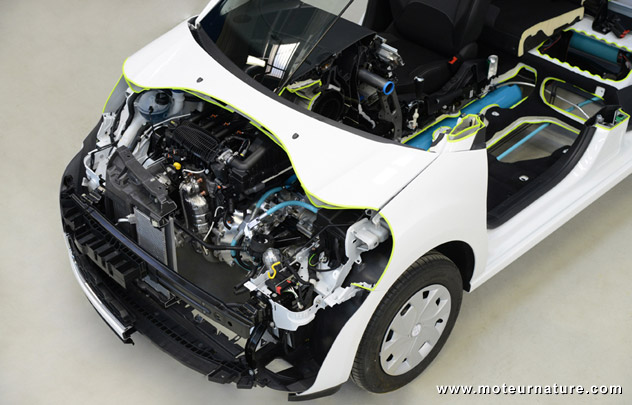
French manufacturer PSA Peugeot Citroen unveiled yesterday a prototype with hybrid technology never seen before in a production car: Hybrid Air. Unlike the gas/electric solution which is getting widespread, the deal here is with gas (or diesel) and compressed air. It sounds strange at best and unworkable at worst, but it’s very real. And it works very much a conventional gas/electric hybrid. There’s the main engine, always an ICE, and there’s a second, smaller unit on its side. Instead of being an electric motor, that unit is more like a hydraulic pump. When the car slows down, there’s regenerative action with the wheels driving that hydraulic engine to compress air, before sending it to a high pressure tank. When the driver accelerates, that compressed air is sent back to the hydraulic engine which converts it into a mechanical force sent to the transmission. Depending on the power needs, main ICE engine is on, or off.
It sounds so easy, and so effective, but the technology has several downsides.
First, conversion losses from mechanical force to compressed air and back are more important than getting electricity in and out of a battery. Another drawback is that the whole system has to be added. In a gas/electric hybrid, the electric motor can replace the alternator, but that is not possible here: hydraulic engines don’t make electrical energy.
A very serious issue next, is the sheer size of all the new parts. An electric battery can be of any shape, because cells can be arranged in any way, but a compressed air tank has to be a bulky cylinder. And it must be really big. Energy density of compressed air is so low, that even if a car had its trunk fully filled with compressed air bottles, it would barely have enough energy to drive more than a few miles at low speed.
So let’s put it clearly. Compared to Toyota’s technology, which provides silky smooth power delivery and which can be modified to give more range with the ICE off, the Hybrid Air technology is inferior. It’s also noisier, but it’s probably correct it has a price advantage. Will it keep it for long? Nobody can be sure of that. Can the hybrid air get better with more development? Batteries are changing fast, and are getting cheaper, like all electronics parts. There’s much less to gain in hydraulic engines or gas pressure tanks.
Our best guess is that Peugeot Citroen is trying to build a hybrid on a budget. The Hybrid Air technology would have been great 15 years ago, but we see Toyota’s hybrids getting better and cheaper in each new generation. PSA Peugeot-Citroen says that its Hybrid-Air tech could be in a production vehicle in 2016, it might be too late.